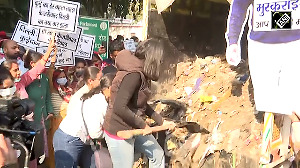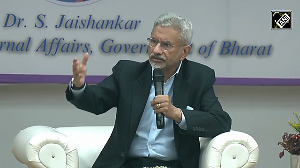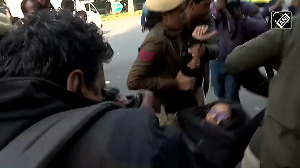Uttar Pradesh will usher in single party rule after 14 years with the thumping victory of the Mayawati-led Bahujan Samaj Party bringing coalition politics to an end.
BSP reached the crucial 202 mark in the 403-member House as the results of the assembly polls were announced on Friday.
Riding on the Ram wave, Kalyan Singh led the last single party government when Bharatiya Janata Party assumed office on June 24, 1991.
The government was dismissed on December 6, 1992 by the Centre following demolition of the Babri Masjid at Ayodhya.
The assembly elections in 1993 saw Samajwadi Party and BSP fighting the polls together and had won 175 seats.
Though the BJP had won 177 seats, the Congress and the Janata Dal extended support to the SP-BSP alliance, which resulted in anointment of Yadav as the chief minister of the state.
The SP-BSP government was shortlived and the two parties turned bitter foes after the attack on the BSP supremo Mayawati in 1995 following her withdrawal of support to the SP government.
The assembly polls that followed soon after were held under the President's rule in 1996 and saw BSP forging an alliance with the Congress and bagging 67 seats while the Congress had to contend with only 33 seats.
The BJP had, in 1996, won 176 seats and emerged as the single largest party but yet it could not form the government as no party was ready to support it.
The BJP and BSP, however, stitched an alliance about seven months after the polls on the basis of six monthly rotational formula.
BSP leader Mayawati became the chief minister for the first six months but later broke the alliance throwing the state into political turmoil once again.
A split in the BSP later saw BJP catapulting to power again with Kalyan Singh heading the government.
Singh, however, had to later leave the post following internal dissension in the BJP and Ram Prakash Gupta assumed the reigns of the state only to later pave the way for Rajnath Singh.
Meanwhile, Kalyan Singh had left the BJP and formed his own Rashtriya Kranti Party.
The assembly elections in 2002 saw SP emerging as the single largest party with 143 seats followed by the BSP with 98 and the BJP with 88 seats.
After two months of President's rule in the state, the BJP and BSP stitched another alliance and Mayawati once again became the chief minister of the state.
The alliance was, however, shortlived as she resigned after being indicted in the Taj heritage corridor scam by the apex court and institution of a CBI probe.
The BSP once again split, albeit in a controversial manner and Mulayam Singh Yadav became the chief minister of the state in August 2003 with the help of independents and RKP besides the BSP's splinter group numbering 37.
Almost all the pre- and post-poll surveys had predicted a hung assembly in the state again but the voters appeared to have made up their mind to end the political instability once and for all, giving Mayawati another chance to don the mantle of the state all alone with no alliance partner.
It remains to be seen, however, if Mayawati's newly stitched upper caste-Dalit combination is able to give a stable government.






 © 2025
© 2025